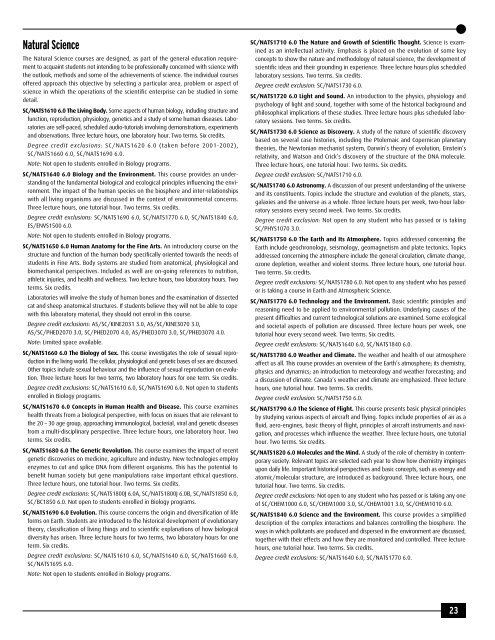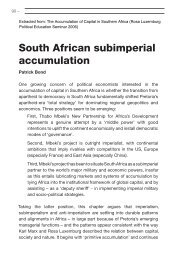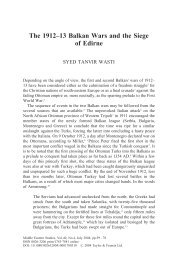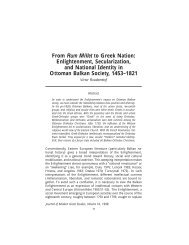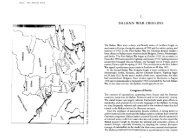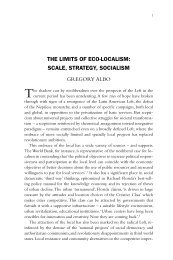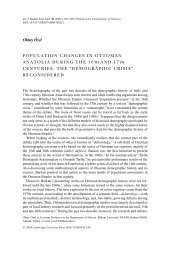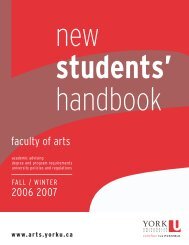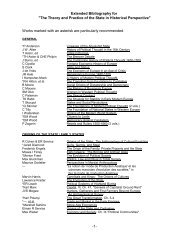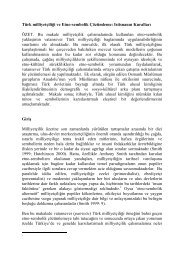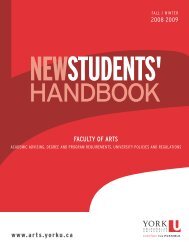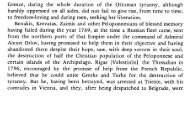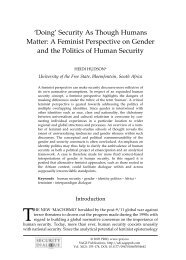FYCSG 05/06 REV2 - Faculty of Arts - York University
FYCSG 05/06 REV2 - Faculty of Arts - York University
FYCSG 05/06 REV2 - Faculty of Arts - York University
You also want an ePaper? Increase the reach of your titles
YUMPU automatically turns print PDFs into web optimized ePapers that Google loves.
Natural Science<br />
The Natural Science courses are designed, as part <strong>of</strong> the general education requirement<br />
to acquaint students not intending to be pr<strong>of</strong>essionally concerned with science with<br />
the outlook, methods and some <strong>of</strong> the achievements <strong>of</strong> science. The individual courses<br />
<strong>of</strong>fered approach this objective by selecting a particular area, problem or aspect <strong>of</strong><br />
science in which the operations <strong>of</strong> the scientific enterprise can be studied in some<br />
detail.<br />
SC/NATS1610 6.0 The Living Body. Some aspects <strong>of</strong> human biology, including structure and<br />
function, reproduction, physiology, genetics and a study <strong>of</strong> some human diseases. Laboratories<br />
are self-paced, scheduled audio-tutorials involving demonstrations, experiments<br />
and observations. Three lecture hours, one laboratory hour. Two terms. Six credits.<br />
Degree credit exclusions: SC/NATS1620 6.0 (taken before 2001-2002),<br />
SC/NATS1660 6.0, SC/NATS1690 6.0.<br />
Note: Not open to students enrolled in Biology programs.<br />
SC/NATS1640 6.0 Biology and the Environment. This course provides an understanding<br />
<strong>of</strong> the fundamental biological and ecological principles influencing the environment.<br />
The impact <strong>of</strong> the human species on the biosphere and inter-relationships<br />
with all living organisms are discussed in the context <strong>of</strong> environmental concerns.<br />
Three lecture hours, one tutorial hour. Two terms. Six credits.<br />
Degree credit exclusions: SC/NATS1690 6.0, SC/NATS1770 6.0, SC/NATS1840 6.0,<br />
ES/ENVS1500 6.0.<br />
Note: Not open to students enrolled in Biology programs.<br />
SC/NATS1650 6.0 Human Anatomy for the Fine <strong>Arts</strong>. An introductory course on the<br />
structure and function <strong>of</strong> the human body specifically oriented towards the needs <strong>of</strong><br />
students in Fine <strong>Arts</strong>. Body systems are studied from anatomical, physiological and<br />
biomechanical perspectives. Included as well are on-going references to nutrition,<br />
athletic injuries, and health and wellness. Two lecture hours, two laboratory hours. Two<br />
terms. Six credits.<br />
Laboratories will involve the study <strong>of</strong> human bones and the examination <strong>of</strong> dissected<br />
cat and sheep anatomical structures. If students believe they will not be able to cope<br />
with this laboratory material, they should not enrol in this course.<br />
Degree credit exclusions: AS/SC/KINE2031 3.0, AS/SC/KINE3070 3.0,<br />
AS/SC/PHED2070 3.0, SC/PHED2070 4.0, AS/PHED3070 3.0, SC/PHED3070 4.0.<br />
Note: Limited space available.<br />
SC/NATS1660 6.0 The Biology <strong>of</strong> Sex. This course investigates the role <strong>of</strong> sexual reproduction<br />
in the living world. The cellular, physiological and genetic bases <strong>of</strong> sex are discussed.<br />
Other topics include sexual behaviour and the influence <strong>of</strong> sexual reproduction on evolution.<br />
Three lecture hours for two terms, two laboratory hours for one term. Six credits.<br />
Degree credit exclusions: SC/NATS1610 6.0, SC/NATS1690 6.0. Not open to students<br />
enrolled in Biology programs.<br />
SC/NATS1670 6.0 Concepts in Human Health and Disease. This course examines<br />
health threats from a biological perspective, with focus on issues that are relevant to<br />
the 20 – 30 age group, approaching immunological, bacterial, viral and genetic diseases<br />
from a multi-disciplinary perspective. Three lecture hours, one laboratory hour. Two<br />
terms. Six credits.<br />
SC/NATS1680 6.0 The Genetic Revolution. This course examines the impact <strong>of</strong> recent<br />
genetic discoveries on medicine, agriculture and industry. New technologies employ<br />
enzymes to cut and splice DNA from different organisms. This has the potential to<br />
benefit human society but gene manipulations raise important ethical questions.<br />
Three lecture hours, one tutorial hour. Two terms. Six credits.<br />
Degree credit exclusions: SC/NATS1800J 6.0A, SC/NATS1800J 6.0B, SC/NATS1850 6.0,<br />
SC/BC1850 6.0. Not open to students enrolled in Biology programs.<br />
SC/NATS1690 6.0 Evolution. This course concerns the origin and diversification <strong>of</strong> life<br />
forms on Earth. Students are introduced to the historical development <strong>of</strong> evolutionary<br />
theory, classification <strong>of</strong> living things and to scientific explanations <strong>of</strong> how biological<br />
diversity has arisen. Three lecture hours for two terms, two laboratory hours for one<br />
term. Six credits.<br />
Degree credit exclusions: SC/NATS1610 6.0, SC/NATS1640 6.0, SC/NATS1660 6.0,<br />
SC/NATS1695 6.0.<br />
Note: Not open to students enrolled in Biology programs.<br />
SC/NATS1710 6.0 The Nature and Growth <strong>of</strong> Scientific Thought. Science is examined<br />
as an intellectual activity. Emphasis is placed on the evolution <strong>of</strong> some key<br />
concepts to show the nature and methodology <strong>of</strong> natural science, the development <strong>of</strong><br />
scientific ideas and their grounding in experience. Three lecture hours plus scheduled<br />
laboratory sessions. Two terms. Six credits.<br />
Degree credit exclusion: SC/NATS1730 6.0.<br />
SC/NATS1720 6.0 Light and Sound. An introduction to the physics, physiology and<br />
psychology <strong>of</strong> light and sound, together with some <strong>of</strong> the historical background and<br />
philosophical implications <strong>of</strong> these studies. Three lecture hours plus scheduled laboratory<br />
sessions. Two terms. Six credits.<br />
SC/NATS1730 6.0 Science as Discovery. A study <strong>of</strong> the nature <strong>of</strong> scientific discovery<br />
based on several case histories, including the Ptolemaic and Copernican planetary<br />
theories, the Newtonian mechanist system, Darwin’s theory <strong>of</strong> evolution, Einstein’s<br />
relativity, and Watson and Crick’s discovery <strong>of</strong> the structure <strong>of</strong> the DNA molecule.<br />
Three lecture hours, one tutorial hour. Two terms. Six credits.<br />
Degree credit exclusion: SC/NATS1710 6.0.<br />
SC/NATS1740 6.0 Astronomy. A discussion <strong>of</strong> our present understanding <strong>of</strong> the universe<br />
and its constituents. Topics include the structure and evolution <strong>of</strong> the planets, stars,<br />
galaxies and the universe as a whole. Three lecture hours per week, two-hour laboratory<br />
sessions every second week. Two terms. Six credits.<br />
Degree credit exclusion: Not open to any student who has passed or is taking<br />
SC/PHYS1070 3.0.<br />
SC/NATS1750 6.0 The Earth and Its Atmosphere. Topics addressed concerning the<br />
Earth include geochronology, seismology, geomagnetism and plate tectonics. Topics<br />
addressed concerning the atmosphere include the general circulation, climate change,<br />
ozone depletion, weather and violent storms. Three lecture hours, one tutorial hour.<br />
Two terms. Six credits.<br />
Degree credit exclusions: SC/NATS1780 6.0. Not open to any student who has passed<br />
or is taking a course in Earth and Atmospheric Science.<br />
SC/NATS1770 6.0 Technology and the Environment. Basic scientific principles and<br />
reasoning need to be applied to environmental pollution. Underlying causes <strong>of</strong> the<br />
present difficulties and current technological solutions are examined. Some ecological<br />
and societal aspects <strong>of</strong> pollution are discussed. Three lecture hours per week, one<br />
tutorial hour every second week. Two terms. Six credits.<br />
Degree credit exclusions: SC/NATS1640 6.0, SC/NATS1840 6.0.<br />
SC/NATS1780 6.0 Weather and Climate. The weather and health <strong>of</strong> our atmosphere<br />
affect us all. This course provides an overview <strong>of</strong> the Earth’s atmosphere; its chemistry,<br />
physics and dynamics; an introduction to meteorology and weather forecasting; and<br />
a discussion <strong>of</strong> climate. Canada’s weather and climate are emphasized. Three lecture<br />
hours, one tutorial hour. Two terms. Six credits.<br />
Degree credit exclusion: SC/NATS1750 6.0.<br />
SC/NATS1790 6.0 The Science <strong>of</strong> Flight. This course presents basic physical principles<br />
by studying various aspects <strong>of</strong> aircraft and flying. Topics include properties <strong>of</strong> air as a<br />
fluid, aero-engines, basic theory <strong>of</strong> flight, principles <strong>of</strong> aircraft instruments and navigation,<br />
and processes which influence the weather. Three lecture hours, one tutorial<br />
hour. Two terms. Six credits.<br />
SC/NATS1820 6.0 Molecules and the Mind. A study <strong>of</strong> the role <strong>of</strong> chemistry in contemporary<br />
society. Relevant topics are selected each year to show how chemistry impinges<br />
upon daily life. Important historical perspectives and basic concepts, such as energy and<br />
atomic/molecular structure, are introduced as background. Three lecture hours, one<br />
tutorial hour. Two terms. Six credits.<br />
Degree credit exclusions: Not open to any student who has passed or is taking any one<br />
<strong>of</strong> SC/CHEM1000 6.0, SC/CHEM1000 3.0, SC/CHEM1001 3.0, SC/CHEM1010 6.0.<br />
SC/NATS1840 6.0 Science and the Environment. This course provides a simplified<br />
description <strong>of</strong> the complex interactions and balances controlling the biosphere. The<br />
ways in which pollutants are produced and dispersed in the environment are discussed,<br />
together with their effects and how they are monitored and controlled. Three lecture<br />
hours, one tutorial hour. Two terms. Six credits.<br />
Degree credit exclusions: SC/NATS1640 6.0, SC/NATS1770 6.0.<br />
23


